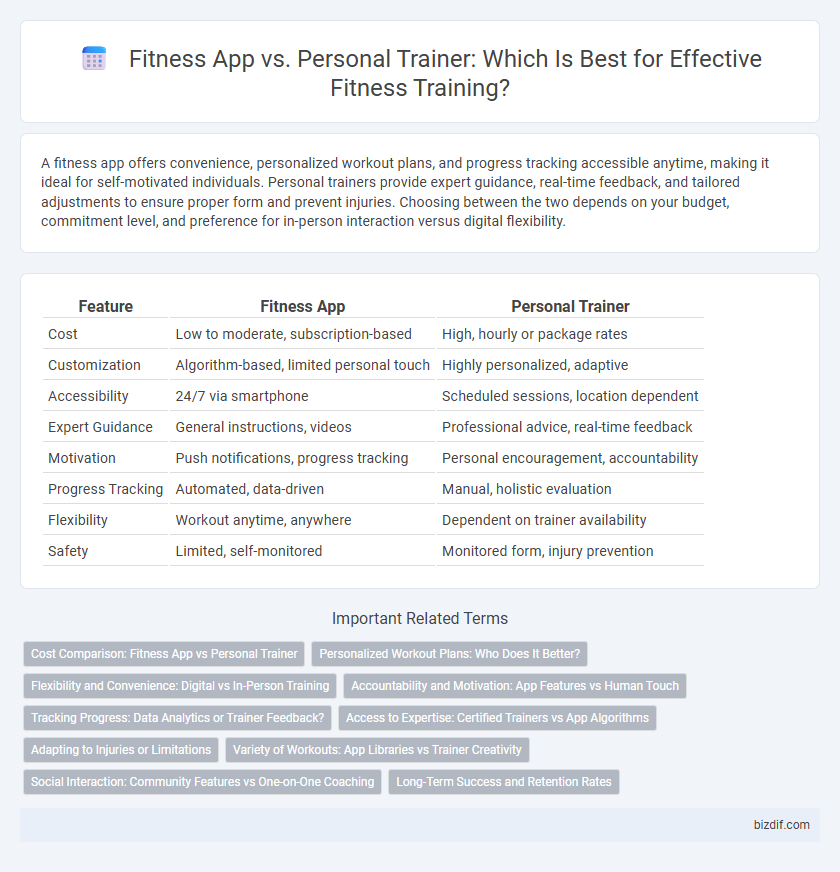A fitness app offers convenience, personalized workout plans, and progress tracking accessible anytime, making it ideal for self-motivated individuals. Personal trainers provide expert guidance, real-time feedback, and tailored adjustments to ensure proper form and prevent injuries. Choosing between the two depends on your budget, commitment level, and preference for in-person interaction versus digital flexibility.
Table of Comparison
| Feature | Fitness App | Personal Trainer |
|---|---|---|
| Cost | Low to moderate, subscription-based | High, hourly or package rates |
| Customization | Algorithm-based, limited personal touch | Highly personalized, adaptive |
| Accessibility | 24/7 via smartphone | Scheduled sessions, location dependent |
| Expert Guidance | General instructions, videos | Professional advice, real-time feedback |
| Motivation | Push notifications, progress tracking | Personal encouragement, accountability |
| Progress Tracking | Automated, data-driven | Manual, holistic evaluation |
| Flexibility | Workout anytime, anywhere | Dependent on trainer availability |
| Safety | Limited, self-monitored | Monitored form, injury prevention |
Cost Comparison: Fitness App vs Personal Trainer
Fitness apps offer a cost-effective alternative to personal trainers, typically costing between $10 and $30 per month compared to personal trainer fees averaging $40 to $100 per session. While fitness apps provide access to a wide range of workout plans and tracking features at a fraction of the price, personal trainers offer personalized guidance and real-time feedback that can justify their higher cost. Choosing between the two depends on budget constraints, the need for personalized support, and specific fitness goals.
Personalized Workout Plans: Who Does It Better?
Fitness apps leverage AI algorithms and user data to create highly customizable workout plans tailored to individual goals, fitness levels, and progress tracking. Personal trainers offer expert guidance with real-time adjustments, personalized motivation, and technique correction that apps cannot replicate. While apps excel in convenience and data-driven personalization, personal trainers provide unparalleled accountability and customized support for optimal results.
Flexibility and Convenience: Digital vs In-Person Training
Fitness apps offer unparalleled flexibility and convenience by allowing users to exercise anytime and anywhere, fitting workouts seamlessly into busy schedules. Personal trainers provide tailored in-person training sessions, ensuring real-time feedback and motivation but require fixed appointments and physical presence. Choosing between digital apps and personal trainers depends on individual preferences for adaptable routines versus personalized, hands-on guidance.
Accountability and Motivation: App Features vs Human Touch
Fitness apps provide structured workout plans, progress tracking, and push notifications that foster consistent accountability and motivation through data-driven feedback. Personal trainers offer personalized encouragement, real-time adjustments, and emotional support, which enhance motivation by addressing individual needs and form. Combining app features with a human touch can maximize adherence to fitness goals by blending technological reminders with empathetic coaching.
Tracking Progress: Data Analytics or Trainer Feedback?
Fitness apps provide comprehensive data analytics that track metrics such as heart rate, calories burned, and workout frequency, offering real-time progress visualization through detailed charts and graphs. Personal trainers deliver personalized feedback based on observational insights and individual performance, adjusting routines to prevent plateaus and reduce injury risk. Combining app-driven data analytics with expert trainer guidance maximizes motivation and effectiveness in fitness progress tracking.
Access to Expertise: Certified Trainers vs App Algorithms
Personal trainers provide direct access to certified fitness experts who tailor workouts based on individual goals, health conditions, and real-time feedback, ensuring safety and effectiveness. Fitness apps rely on algorithms and pre-designed programs that adapt to user input but lack personalized nuance and professional assessment in critical situations. While apps offer convenience and cost-effectiveness, certified trainers deliver specialized expertise that optimizes performance and injury prevention.
Adapting to Injuries or Limitations
Fitness apps provide customizable workout plans that can be quickly adjusted for injuries or physical limitations using AI-driven algorithms and user feedback. Personal trainers offer personalized attention and expert assessment, tailoring exercises in real-time to accommodate specific injuries and ensure safe progression. Combining app data with professional guidance maximizes injury adaptation and promotes effective recovery.
Variety of Workouts: App Libraries vs Trainer Creativity
Fitness apps offer extensive libraries with hundreds of workout variations, enabling users to tailor routines based on goals, intensity, and time constraints. Personal trainers bring dynamic creativity, customizing exercises in real-time to address individual needs, form corrections, and progress adjustments. Combining app variety with trainer expertise delivers a comprehensive fitness experience that adapts continuously for optimal results.
Social Interaction: Community Features vs One-on-One Coaching
Fitness apps foster social interaction through community features such as group challenges, leaderboards, and forums that encourage peer motivation and support. Personal trainers offer one-on-one coaching, providing personalized feedback, accountability, and tailored guidance in real time. The choice between a fitness app and a personal trainer depends on whether targeted social engagement or individualized attention is a higher priority.
Long-Term Success and Retention Rates
Fitness apps offer convenient, cost-effective solutions with personalized workout plans that adapt to user progress, boosting long-term engagement through gamification and progress tracking. Personal trainers provide tailored motivation, real-time feedback, and expert guidance that significantly improve retention rates and adherence to fitness goals over extended periods. Studies show that combining both approaches often leads to the highest success in maintaining consistent workout habits and achieving lasting fitness results.
Fitness app vs Personal trainer Infographic

 bizdif.com
bizdif.com